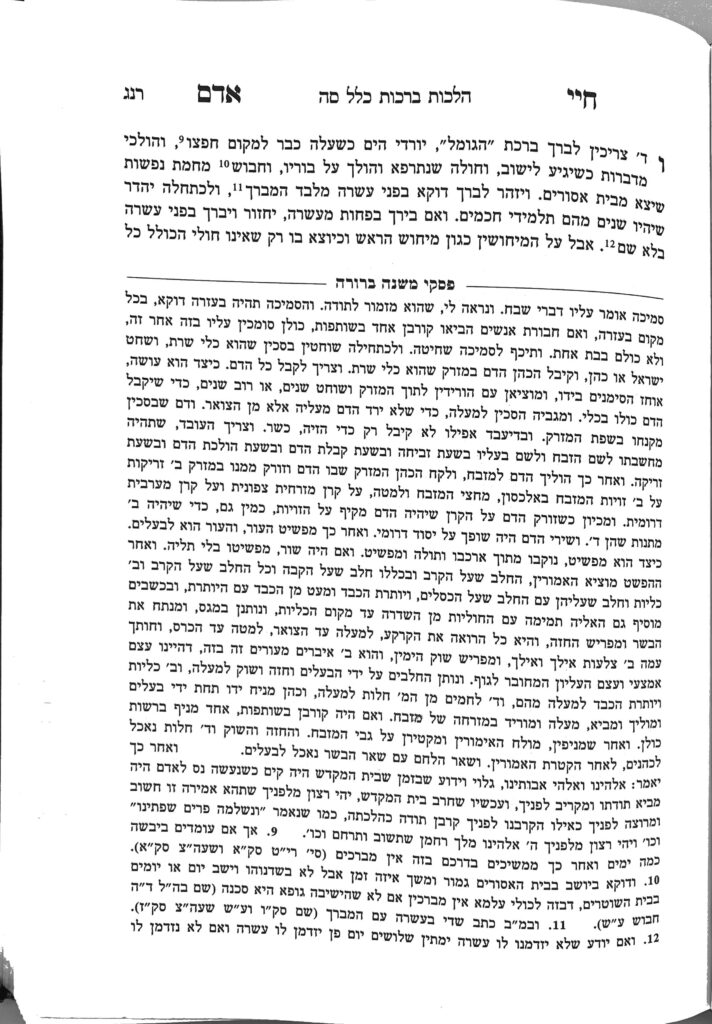We are continuing in siman 6, which discusses birchas hagomeil. The Chayei Adam will discuss the four scenarios mentioned in Chazal in which one recites hagomeil.
The Chayei Adam begins by discussing one who went out to sea. If someone went out to sea and returned, they recite hagomeil. If one is travelling overseas one way, they recite hagomeil at their destination. If one makes multiple stops, even if they stop for a few days, they do not recite hagomeil until they arrive at their final destination.
One who travels through the desert recites hagomeil when they arrive at their destination, due to the dangerous, potentially life-threatening conditions of the desert. Again, if one pauses mid-route at an oasis, they do not recite hagomeil, but wait until they reach their final destination.
A sick person who recovers must be omeid al burio, at full strength, to recite hagomeil. Therefore, recovering from an illness alone does not always suffice to recite hagomeil, because the choleh is not necessarily at their full strength if they still require therapies or bedrest. In such a case, they would not recite hagomeil until they have regained their full strength and the healing process is complete. However, if one reaches as far through the process as they will go (i.e., they will never fully regain their previous strength), they recite hagomeil at that point.
The poskim discuss a situation where one has fully recovered (i.e., regained their previous strength), but the doctors want the person to continue treatments and therapies in order to become stronger. In such a case, the person is considered received, and would recite hagomeil before the extra treatments.
Regarding someone imprisoned, the Chayei Adam differentiates between one imprisoned before their verdict and after their verdict. Before their verdict, one would only recite the bracha if they were imprisoned on life or death charges.. If they were imprisoned due to a monetary issue, they would not recite hagomeil.
After the verdict, even if one were sentenced to prison on a life or death charge, since they escaped the death penalty, they would not recite hagomeil after finishing their sentence. However, they would recite hagomeil for the period of time before the verdict when they were in danger of being sentenced to death. In such a case, they should recite hagomeil as soon as possible after the verdict, (i.e., before beginning to serve their sentence) because the hagomeil is being recited on the period before their verdict.
Practically, there is a range of realities as to what prison can entail. If the prison is a third world country unto itself, and one is in danger from the guards or the inmates, one would recite hagomeil even after a short amount of time, regardless of the charges.
One should recite the bracha in front of ten other people. The Mishnah Berurah writes that one can recite the bracha in front of nine other people, so that there are 10 including the one reciting the bracha. We will discuss what to do if one does not have 10 tomorrow, be’ezras Hashem.
Summary
- If one pauses in the middle of a trip, whether at sea or in the desert, they do not recite hagomeil, but recite it at the end of their trip, once they have reached their destination.
- A sick person recites hagomeil when they have regained their full strength.
- If they will not regain their full strength, they recite it at the point at which they are most healed.
- If they have regained their full strength, but the doctors want the patient to become stronger, they recite hagomeil before further treatment.
- A person who was imprisoned recites hagomeil if they were in prison due to a life or death charge, or if the prison itself was dangerous.



